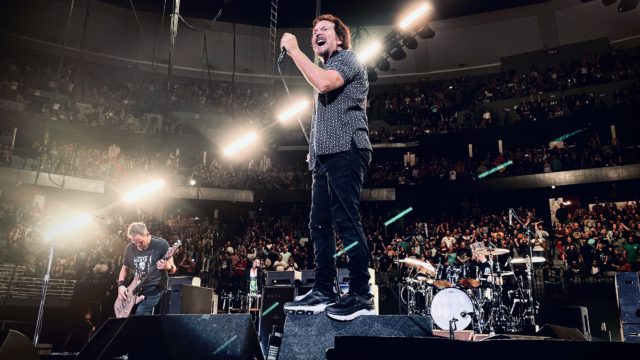
As Pearl Jam’s two-and-a-half-hour, tour-closing show at Ball Arena concluded last night and the Seattle rock group stood on stage thanking fans and crew, notoriously loquacious frontman Eddie Vedder introduced his bandmates one by one.
“These are the names of the people who love you,” the baritone singer announced. “I love you too.”

The high-energy concert, which was originally scheduled for April 2020 and delayed by the onset of the global COVID-19 pandemic, was Pearl Jam’s first stop in Denver since October 2014. Back then, the one grunge act that never faded away or burned out played a sprawling, hard-rocking 39-song set, and Vedder drank so much he was tripping over monitors and handing out bottles of wine to fans like major-leaguers hand out baseballs. Last night, Pearl Jam started its 25-song show with “stool music” — most of the band was seated for a mellow four-song opener that beckoned passionate fans (virtually all white and middle-aged, engaging in a full-throated trip back to the ’90s) to hit high the high notes of the nostalgic-songs-about-nostalgia “Long Road” and “Elderly Woman Behind the Counter In a Small Town.”
In recent years, the 57-year-old Vedder has often — if not mostly — let audiences hit the big, soaring choruses he’s known for. He’s also hid behind a baseball cap on stage and during interviews.
In Denver, however, Vedder stepped into the proverbial batter’s box, swinging with soaring lead vocals on “Long Road,” a song that was originally recorded with Neil Young on pump organ and actually debuted in Colorado back in 1995 when Pearl Jam played back-to-back gigs at Red Rocks. As a tease of Pink Floyd’s 1967 tripper “Interstellar Overdrive” gave way to “Corduroy” — one of Pearl Jam’s most iconic ’90s hits and Vedder’s most famous song about being famous — it was clear the very loud, very rocking portion of the show had begun and, it being the last night of the tour, Vedder was holding nothing back vocally.
With another nod to Neil Young, who Vedder referred to as “our favorite Coloradan” because his last two records have been recorded here, Pearl Jam tore into “Throw Your Hatred Down” from Mirror Ball, the underrated 1995 album that found the group serving as Young’s backing band. “Hatred” allowed rhythm guitarist Stone Gossard a rare chance to rip a few solos, but when the 1991 rager “Even Flow” thundered its way into the set, it was time for lead guitarist Mike McCready to shine.
“He’s about to go off,” Vedder said of McCready before “Even Flow.” “No pressure.”

McCready, ever the ham, played an extended, jaw-dropping Hendrix-inspired solo on a beat-up Fender Stratocaster he held behind his neck. It was ironically his most reserved moment of the long night, which otherwise found him intermittently running laps around the stage and writhing on top of speakers.
McCready and Vedder famously joined Gossard and bassist Jeff Ament in 1990 after the latter two saw their rock ‘n’ roll dreams seem to crumble with the death of their bandmate, Mother Love Bone singer Andy Wood. Instead, Vedder added his love of Fugazi, the Clash, the Who and Bad Religion to Mother Love Bone’s decadent, glammy, Aerosmith-inspired take on grunge, and Pearl Jam became classic rock almost overnight.
Thirty-plus years later, Vedder and his bandmates — with aging, smiling faces — jumped around the big Ball Arena stage just as they did in Pearl Jam’s 1991 breakthrough video for “Alive.” Unlike Pearl Jam’s last trip to Denver, Vedder kept himself to a couple bottles of wine and, even by set’s end, had no problem traversing the seven monitors that surrounded him, even while windmilling and leaping around like Pete Townshend. He did mention the struggle to sing in the Mile High City air, notably before the group played “Thin Air,” and regaled the packed arena of just under 20,000 fans with memories from Pearl Jam’s early days, when Vedder could take the biggest bong rips of any band member.
Any Pearl Jam show is memorable not just for the Springsteen-like sustained energy (only Ween and My Morning Jacket come to mind when it comes to rock bands with as much stamina), but also for Vedder’s banter. Before the show was half over, he’d already asked a female concert goer for her sparkly shirt; mused on the need for stricter gun control; rallied against Vladimir Putin; paid tribute to Tom Petty; said he’d like for Pearl Jam to return to Red Rocks for another two-night stand; welcomed “Into the Wild” author Jon Krakauer to the show; and eloquently trashed Alex Jones for profiting off of lies and hatred.
As the lights came on for the last few songs, the most powerful message of the evening came with Vedder (covered in sweat) singing along with the crowd, “We’re all still alive” and throwing dozens of tambourines to Ball Arena fans. Pearl Jam emerged in the fall of 1991 with the “Alive” video, which was just footage of a concert in Seattle, and after the group’s award-winning 1992 video for “Jeremy,” it quickly stopped promoting itself beyond being the captivating live band from the “Alive” video. Through the deaths of Kurt Cobain, Layne Staley and Chris Cornell to the George W. Bush, Trump and pandemic eras, Vedder and Co. are somehow still alive; still getting an incredible amount of exercise on stage and spending a lot of money on tambourines; and, yes, they still said, “You don’t have to go home but you can’t stay here” by closing with “Yellow Ledbetter.”














